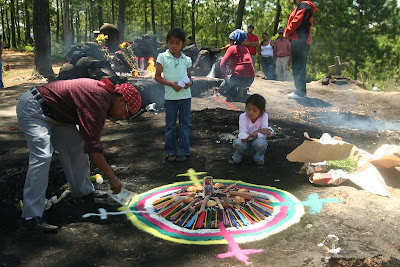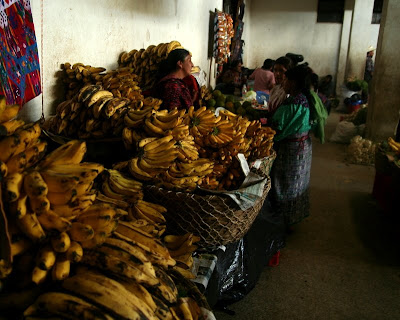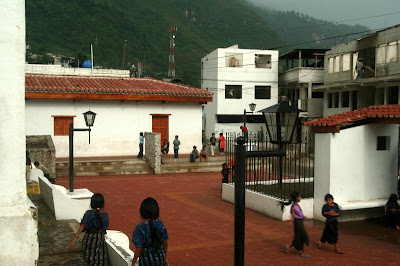
This is a good picture of the house. Catarina is making
pulike at the sink. Behind her is the dining room. In the distance on the left, you see the ``stairs`` that lead up to the building where my bedroom is.
Yesterday, Tim (Dr Wallace) and Carla came here to Santa Catarina for my two-on-one session. We went to the hotel in the middle of town which, as I have told one classmate, is so nice that I hadn't even looked in there too long. We lazily moved across the courtyard admiring the bizarre flora and sat at one of the tables with a flower floating in water in a glass vase in the center, where I took it all in (see the two photos below). The waiter served us individual butter wrapped in what I took to be small corn husks. Dr Wallace sipped the coffee and guessed correctly that the coffee was from Mike at Crossroads Cafe in Panajachel (see 28 de Mayo entry). I got a mango licuado, which is basically a smoothie except that it's not necessarily cold: the thickness comes from the fruit. They served it in a tall blue glass. It was weird to think that I was not 150 yards away from Luis's gallery, where 3 hours later I was to sit on a dirty floor and eat a lukewarm chuchito for lunch.
This meeting was kind of a progress report on my assignments and classroom performance and a check-up on my project. Dr Wallace got really into the methodology, probing into my approaches and the structure of my project, asking questions of its validity, some of which I was not prepared to answer.
Apart from that, we talked about the experience in general. I shared some unresolved frustrations that I've had (elaborated upon in the infamous 9 de Junio entry), and they commended my introspection and then cautioned that too much introspection can lead to a kind of paralysis. I said something in response about how that's at least one reason the program was good for me, forcing me to act in spite of unresolved frustrations.
“Well see, there you go again,” Dr Wallace replied.
On Sunday we went to Chichicastenango, renown for its Sunday market. We climbed a pine-covered hill outside of town to observe a worship service, a bizarre mix of Mayan and Christian practices; I had to wait around for a while before they would let me take photos. I talked with one worshipper who had spent some time in the U.S. He told me that this was his first time to this service and that he wanted to thank the gods for granting him safe travel to and from the U.S.
For the rest of my time in Chichi, I swam through the market crowds and visited the churches. One church had hundreds of candles lit all around the sanctuary.
I am about halfway through Ralph Ellison's Invisible Man. It's a trip. It`s about a black guy about my age who moves from the south up to Harlem. It`s like a mixture of The Matrix and Forrest Gump.
My relationships with my homestay family continue to deepen, especially with Luis and Catarina, and especially with Catarina. I find her affable and it seems we have similar senses of humor.
A good example: a dog named Chasso, who is not technically theirs but who hangs around the house enough to be, still doesn't really know what to do with me. He barks at me like I'm a threat, but then I see him following me out of the corner of my eye when I walk by him, and he'll start to bark or run away if I look at him again.
Well sometimes, just to amuse myself, I will jolt at Chasso to spook him. This makes him run around and start barking like crazy, like “look look everyone he is bad news!” Now, I think this is totally hilarious, but I don't laugh about it because I'm being Dan-yell (which if you don't know is the perpetually self-conscious alter-ego that I assume when I'm living in Santa Catarina; once again, see the 9 de Junio entry). So, while Luis would just look at this and say something like, “Yes, Chasso is very scared,” Catarina laughs genuinely, even when she knows that I don't know she's watching. Por eso ella me gusta.
The night before last, Catarina and I were walking back up to the house from the shop, and she asked me about my day, and we talked and I asked her about hers. Not only does this show a basic friendliness, but it is also a vote of confidence towards my Spanish, because she's initiating a normal conversation, assuming that I will be able to “chat.”
Walking up the stairs, I had just come from an especially-awkward interview with a group of more “modern” folks who own a restaurant by the lake. We passed an old woman traditionally-dressed carrying something on her head, and she and Catarina exchanged a Kaqchikel greeting. I thought, “Now that is someone whom I would love to interview,” imagining what the age-old folks around here think about the dogs. This was the first time I have ever humored the thought of interviewing an old woman, and I realized that it was because I was walking with Catarina. I suddenly felt closer to the old lady, as if she were moving out of complete strangerhood into a network of friends. If Catarina becomes more comfortable with me, then maybe some of the locals will too.
Although now I remember waiting for a pickup to San Antonio directly across the road from where Catarina was hanging out with a bunch of local women cackling and gossiping, and it seems that I am very far away from talking seriously with any of them. I especially want to interview some of the women street vendors, seeing as the do their business in the street, where dogs “do their business,” so they are probably pretty opinionated.
Speaking of ulterior motives for becoming friends with Catarina, it seems that as I show more interest in food (e.g., torilla-making), she shows more interest in cooking good things for me to try. Two nights ago for dinner she made her favorite dish, pulike. I watched her make it: it's basically a tomato-based soup with masa (a kind of cornmeal) to thicken it up along with onions, cilantro (which they grow in a little garden that I had never seen before), salt, consume de pollo (which I guess is like dried chicken broth; I don't know anything about cooking) and a kind of meat like chicken, although we ate it with mushrooms. It's been raining a lot so there are a lot of mushrooms. It was pretty tasty. We had it again for lunch today because it is Luis Miguel's 8th birthday. I bought him some marbles, which are all the rage here. Wilson said to him, “That's nothing. I've got a lot more.” And went inside and got his box of marbles and rattled it in the left, left, left right left rhythm. Luis Miguel told me that he would win Wilson's marbles. The showdown is taking place right outside my door right now. I hope my birthday present for Luis Miguel doesn't turn into an early birthday present for Wilson.
Back to my project: interviews with people are going okay. I'm yet to hit a rhythm or get on a roll: each interview is its own painstaking, awkward animal. Two days ago at an appointment interview I was met by a group of people who didn't speak very good Spanish (and wouldn't admit it). I would ask a question, and the woman would look at her friends in stifled laughter, talking in Kaqchikel, not making eye contact with me or answering me. That was frustrating. The interview was saved by one of their guy friends, and he actually had a lot to say so it ended up okay.
And by the way, if you've ever been uncomfortable approaching a stranger to help you out with some kind of cause, try doing it in a language that you (and sometimes the person you're talking to) don't totally know. When things go bad, it's beyond awkwardness, literally, because awkwardness implies some kind of common social tolerance threshold, which doesn't exist between an American and a Catarineco. Granted, you feel less embarrassed because you're not competing for social status in a society where you don't belong, but the frustration is more intense. And social status happens to be something that I do need to worry about, if only for my grade's sake! If I gain a reputation in this small town as Dan-yell, that insensitive American blockhead, then I won't be able to interview anyone.
Dr Wallace told us the story of an anthropologist who worked in a society in which when someone is not present, you refer to him or her with one of a number of set relational names, like “brother of long-arms” or “mother of light-foot.” The people had no respect for the anthropologist, and they decided it would be funny to make up indirectly-insulting names to refer to other people, like “brother of fat-cheeks,” so that the anthropologist unknowingly passed these insults along when he interviewed more and more people. Well, he didn't pick up on this for quite a while, but when he finally did, he found that his months of social data-gathering made nothing but a web of fake people.
To end today, let's talk about fruit. When Luis returns from Panajachel, he sometimes brings bizarre new fruits for me to try. My favorite so far is this thing called mango de leche. It's mango, but it's grown differently or something with some kind of milk or suger, I didn't really understand, but it is deliciously sweet and has a slight milky taste, like coconut milk. It's really really fibrous; I had stuff stuck in my teeth for a day (I had no floss). Then there is this little purple fruit which seems to be exactly in between a plum and a cherry. Most recently, he brought back one melon-shaped fruit with a shell so hard it was almost wooden. He broke it open to reveal slimy fuchsia-orange meat with a giant, shiny, sunflower-seed shaped pit. I could barely finish my half because it was so sweet. Imagine the texture as a cross between a kiwi and an avocado (more slimy than juicy) with the taste of an ultra-sweet breakfast melon, especially the gooey-stringy part of the melon towards the middle that ends up on the edges of your slices.
This reminds me of a passage in For Whom the Bell Tolls in which a half-credible clairvoyant woman is describing the smell of someone who is about to die. She says it's a mixture of three smells (this is missing a lot of details and I'm probably getting some of it wrong because I don't have the book on me): one from a particular kind of brass under a porthole of a boat, one from discarded soil in a particular alleyway in Spain in early spring after it rains, and one you can only get by kissing one of the slightly-mustached old women who walks out of a particular town to put flowers on a certain grave or something. If that sounds overly-dramatic, then good, because the guy she's telling this thinks it's BS too, and then later she confides in him that she's all smoke and mirrors. I just don't want you to get the wrong impression of the book. That doesn't really spoil anything, by the way.

the hotel in Santa Catarina where I had my meeting.

Chichicastenango: A libation of Coca-Cola for the gods. On top of the stone on the left is the severed head of a sacrificed chicken.

The colored sugar represents different things (like green for wealth, white for prosperity, etc., I don`t remembe which is which), as well as the four cardinal directions, as indicated by the crosses. On the pile are candles, bread, cigars, and I don`t remember what else.


walking back to Chichicastenango




Chichicastenango Market

Sarah is always the first target of the street vendors.


The indoor part of the Chichi Market
on the way up to my house

Town Square thing in Santa Catarina
 This is a good picture of the house. Catarina is making pulike at the sink. Behind her is the dining room. In the distance on the left, you see the ``stairs`` that lead up to the building where my bedroom is.
This is a good picture of the house. Catarina is making pulike at the sink. Behind her is the dining room. In the distance on the left, you see the ``stairs`` that lead up to the building where my bedroom is. Chichicastenango: A libation of Coca-Cola for the gods. On top of the stone on the left is the severed head of a sacrificed chicken.
Chichicastenango: A libation of Coca-Cola for the gods. On top of the stone on the left is the severed head of a sacrificed chicken. The colored sugar represents different things (like green for wealth, white for prosperity, etc., I don`t remembe which is which), as well as the four cardinal directions, as indicated by the crosses. On the pile are candles, bread, cigars, and I don`t remember what else.
The colored sugar represents different things (like green for wealth, white for prosperity, etc., I don`t remembe which is which), as well as the four cardinal directions, as indicated by the crosses. On the pile are candles, bread, cigars, and I don`t remember what else.














1 comment:
ok danny you're amazing. awesome documentation grasshopper. i shall follow your superb example in ghana. you were born to blog...
Post a Comment